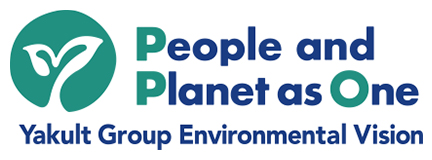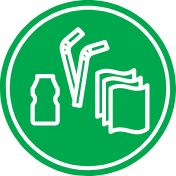 Plastic containers and packaging
Materiality
Plastic containers and packaging
Materiality
Our approach
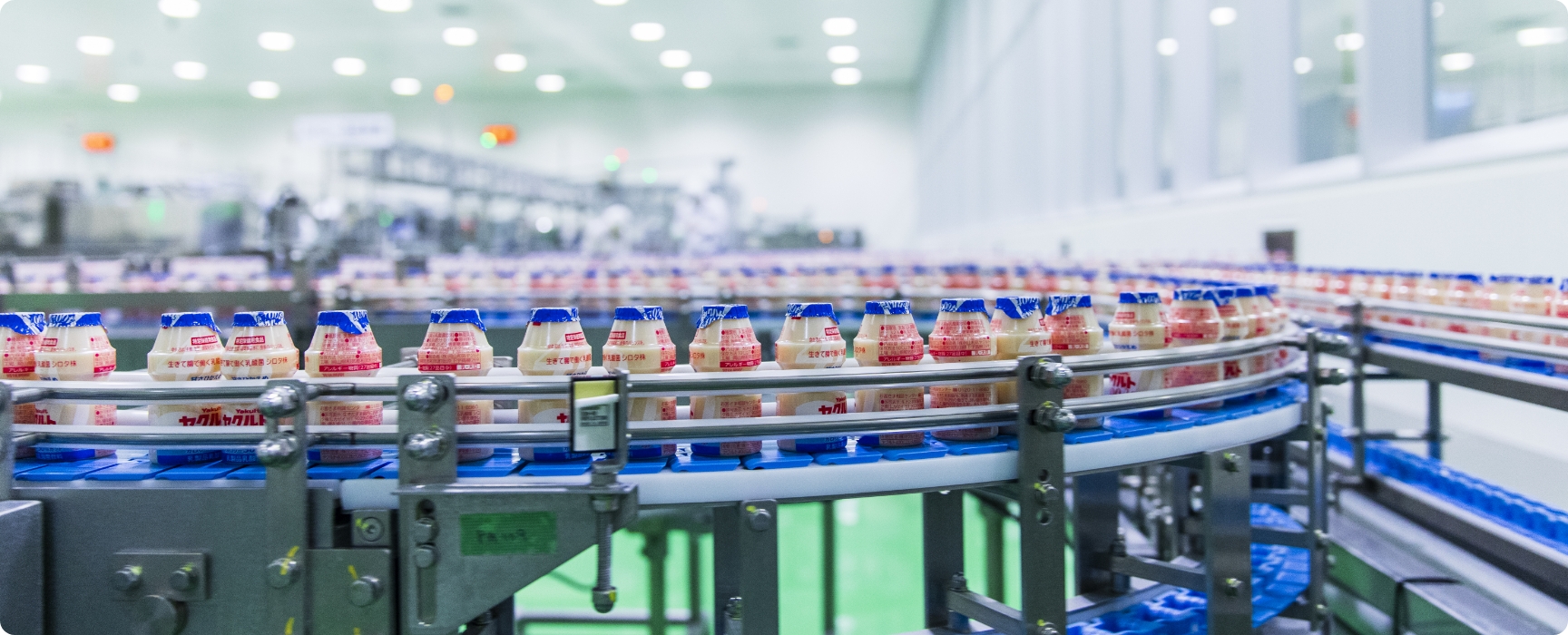
The Yakult Group is keenly aware of how plastic waste contributes to environmental pollution and affects ecosystems, and pursues initiatives regarding containers and packaging with quantitative targets. Specifically, we are striving to reduce the environmental impact of plastic containers and packaging by, for example, making containers and packaging thinner and lighter to reduce the amount of plastic used and improving plastic container and packaging recycling. By transitioning to more easily recyclable materials such as biomass and recycled plastic, we also aim to establish a foundation for environmentally conscious container and packaging technology.
Related SDGs
Promoting plastic recycling of containers and packaging
In recent years, issues such as plastic pollution in oceans, climate change, and natural resource depletion have become global problems. In light of this, Yakult engages in initiatives to promote recycling of plastic containers and packaging.
We announced Environmental Vision 2050 in April 2021. Through Environmental Actions (2021-2024) and Environmental Targets 2030, our short-term and medium-term milestones towards achieving Environmental Vision 2050, we aim to reduce plastic containers and packaging by 5% by the end of fiscal 2024 and by 30% by the end of fiscal 2030 compared to fiscal 2018 levels, or make them recyclable.
Main initiatives
Declaration of Action on Plastic Recycling
As part of our efforts to design containers and packaging with low levels of environmental impact, in 1995 we instituted guidelines for more concrete initiatives with the fundamental goals of ensuring the safety of containers and packaging, reducing the amount of packaging used, optimizing processing/ disposal processes and promoting resource recycling. We announced our Declaration of Action on Plastic Recycling in January 2019 to focus attention on issues such as plastic pollution in oceans, global warming and natural resource depletion, and to show our commitment to recycling our plastic containers and packaging.
Declaration of Action on Plastic Recycling (summary)
The Yakult Group is engaged in initiatives that promote recycling of plastic containers and packaging.
2025 target
We will establish a foundation for environmentally conscious container and packaging technology, and begin conversion to easily recyclable materials such as biomass, recycled and biodegradable materials.
2030 target
We will work to convert to easily recyclable materials as much as possible while keeping up with developments in recycling markets, environmental infrastructure and other external environmental facilities.
Moving forward, we will actively promote resource recycling initiatives, further implementing initiatives beyond these to reduce the amount of plastic used in containers and packaging and reutilize plastic packaging materials in our production processes.
Increased use of biomass materials
Yakult has been working to increase its use of bio-based ink, and has already adopted it in the shrink labels for eight products sold in PET containers, including Milouge. Products using bioplastic and bio-based ink are certified by the Japan Organics Recycling Association as using plant-derived resources (biomass) and conforming to all relevant laws, regulations, and standards for quality and safety, and bear the “Biomass Mark.”
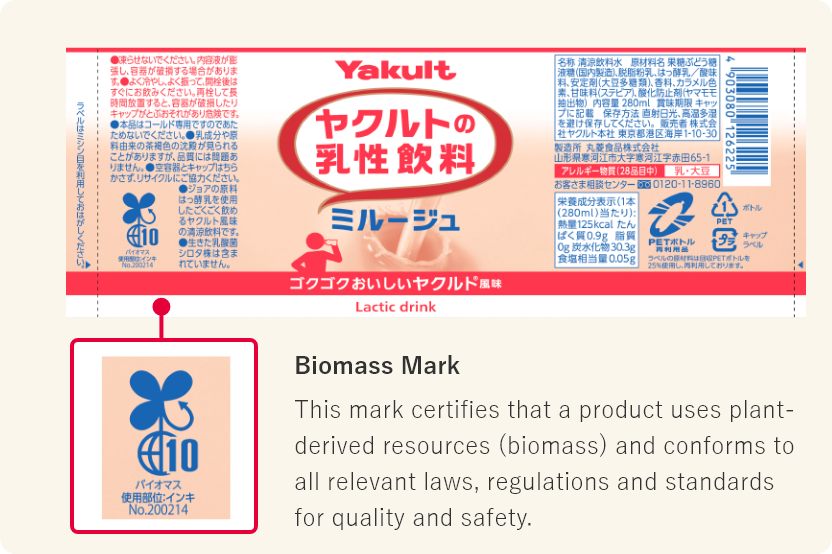
Special
Report
Report from the Frontlines
Addressing marine plastic pollution in a country surrounded by vast oceans : PT. Yakult Indonesia Persada

Addressing marine plastic pollution in a country surrounded by vast oceans : PT. Yakult Indonesia Persada
As the world’s largest archipelagic nation, Indonesia is surrounded by vast oceans, making marine plastic pollution an increasingly serious issue for the country. To help address this issue, Yakult Ladies and direct sales route operators from PT. Yakult Indonesia Persada collect used plastic containers and shrink wrap as part of their daily activities. In this article, one of the managers overseeing this initiative explains our progress to date and future goals.
Stopping the damage to marine ecosystems
Indonesia is a nation made up of over 13,000 islands, with water making up approximately 70% of the country’s total surface area, and is set amid even greater oceanic expanses. The Indonesian government conceives of the country as a maritime nation and is working to develop ports and other oceanic infrastructure while promoting ocean-related industries such as fishing, shipbuilding and tourism. However, Indonesia is also the world’s second largest producer of marine plastic waste and is confronting serious social issues as a result. Some 700 species of marine life around the world, including fish, sea turtles, seabirds, and even marine mammals such as whales and seals, are currently being harmed by marine plastic pollution. This pollution’s effect on marine ecosystems is significant, and has been recognized in recent years as an issue the entire world must address.
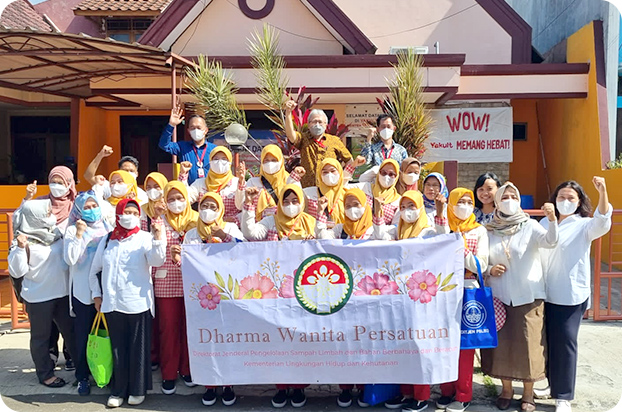
A representative from the Ministry of Environment and Forestry visited our office to give a presentation on handling household waste to Yakult Ladies
Most of Indonesia’s waste is not sorted but simply delivered by truck to landfill sites. Despite a growing recognition among the public of the marine plastic pollution issue, there is low awareness regarding both general waste issues and the idea of sorting waste for recycling. In 2019 the Indonesian Ministry of Environment and Forestry formulated a plan to reduce waste from manufacturers, setting a goal of 30% overall reduction in plastic and other waste by 2029. Under this plan, manufacturers are obligated to submit annual reports and plans for reducing packaging waste. PT. Yakult Indonesia Persada has submitted its own roadmap for reducing overall waste, with goals of a 5% reduction by 2024, followed by 5% reductions annually over the next four years (2025–2028), reaching the final goal of 30% reduction by 2029. To this end, we began an initiative through Yakult Ladies and direct sales route operators to collect used Yakult containers and Yakult 50-pack plastic shrink wrap.

A representative from the Ministry of Environment and Forestry visited our office to give a presentation on handling household waste to Yakult Ladies
Understanding flows from Yakult Ladies and direct sales route operators to the customer
When this initiative began in 2021, there was relatively little understanding of plastic waste issues even among employees and Yakult Ladies, and resistance to anything that would increase workloads. However, as they come to understand our legal obligation to collect plastic packaging waste and the facts surrounding marine plastic pollution, an increasing number of Yakult Ladies and direct sales route operators see the value of these efforts and become active participants in the waste collection initiative. They are now helping to widen the circle of understanding by educating customers and sharing information about marine plastic pollution. Their customers and business partners have welcomed this initiative as a result and are working with us to help achieve our goals. As of April 2023, 30% of Yakult Ladies and 20% of direct sales route operators participate in the collection initiative, making it possible for us to collect approximately 4% of the total waste produced.
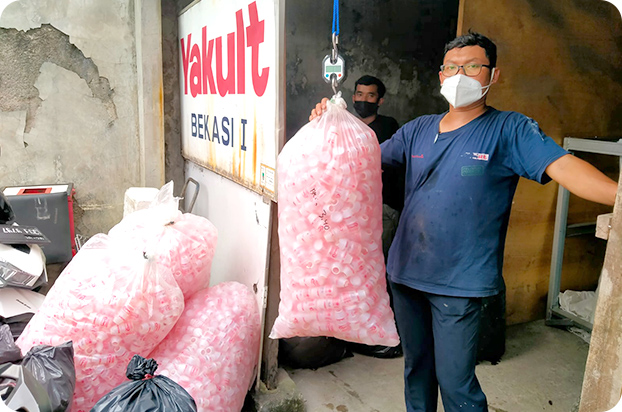
Collecting Yakult containers
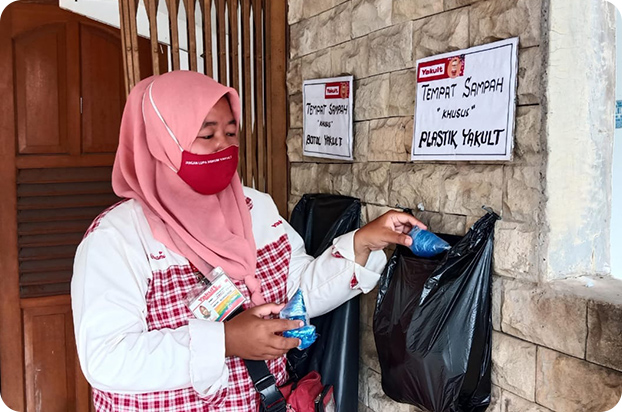
A Yakult Lady separating shrink wrap
Even within the company, I feel that through this initiative, we have deepened our awareness on waste problems faced by Indonesia and our responsibility as a company dealing with plastic waste. Employees also collect empty used Yakult containers either at home or in office through special bins or designated routes.Additionally, we also make enlightening videos about waste reduction initiatives and encourage employees to engage in activities on providing information to internal and external parties.
One of waste collector company which also recycle Yakult waste informed that Yakult plastic waste can be recycled into various types of product, however the specific method of recycling is still under investigation. Therefore we will continue to visit recycling companies to find out more information about the uses of the plastic waste/recycled products.
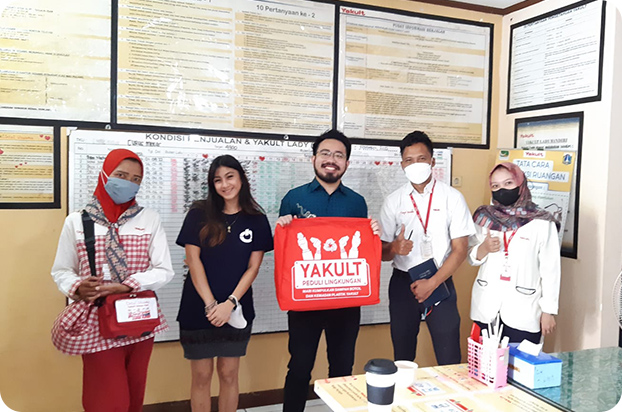
A visit to our office by Rekosistem, a start-up waste collection company
Cooperation with stakeholders will be necessary to further resolve issues
Collecting plastic waste in an archipelagic nation like Indonesia is no easy matter, and there is a limit to what a single company like PT. Yakult Indonesia Persada can do. We seek to actively communicate with a wide range of stakeholders, including government officials, waste management groups and employees, broadening the reach of our awareness-raising activities and providing the most up-to-date information about plastic containers and packaging management. Developing plastic packaging waste collection systems with cooperation from our stakeholders will let us create highly effective recycling processes and reports for the government, establish comfortable working environments for the staff involved, and collect waste efficiently. Our ultimate goals, as defined by the Indonesian Ministry of Environment and Forestry, are to reduce the company’s total waste output by 30% in 2029, and to contribute to improving the situation for waste disposal in Indonesia.
Employee Comment

Company: PT. Yakult Indonesia Persada
Title: Supervisor of PR Science
Name: Ni Putu Desy Aryantini
Employee Comment
I would like to take every possibility to achieve our annual waste reduction targets. By building good systems and producing positive, verifiable results, I hope to show both employees and customers that reducing plastic packaging waste is possible. If we work together, I firmly believe we can improve the environment.
Sustainability
- Home
- /
- Sustainability
- /
- Environmental
- /
- Plastic containers and packaging

